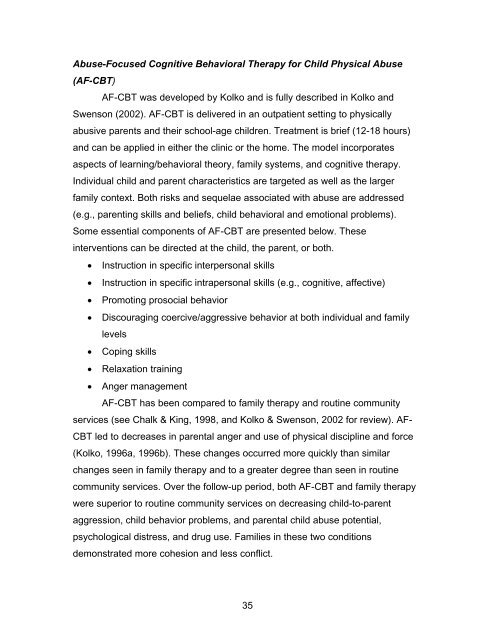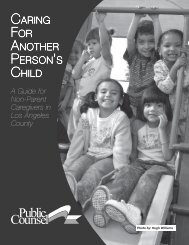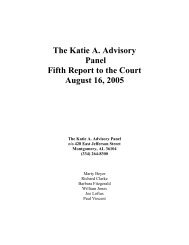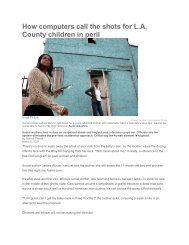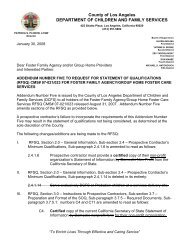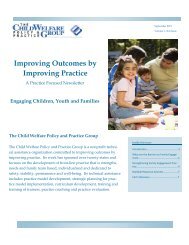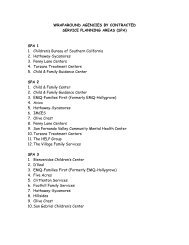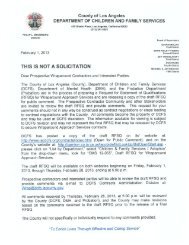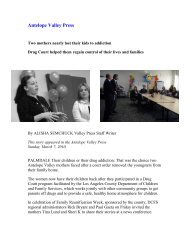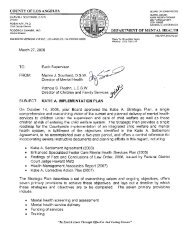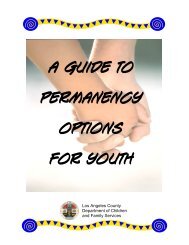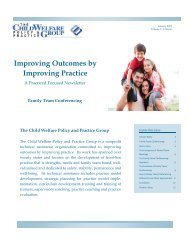Mental Health Care for Children and Adolescents in Foster Care ...
Mental Health Care for Children and Adolescents in Foster Care ...
Mental Health Care for Children and Adolescents in Foster Care ...
You also want an ePaper? Increase the reach of your titles
YUMPU automatically turns print PDFs into web optimized ePapers that Google loves.
Abuse-Focused Cognitive Behavioral Therapy <strong>for</strong> Child Physical Abuse<br />
(AF-CBT)<br />
AF-CBT was developed by Kolko <strong>and</strong> is fully described <strong>in</strong> Kolko <strong>and</strong><br />
Swenson (2002). AF-CBT is delivered <strong>in</strong> an outpatient sett<strong>in</strong>g to physically<br />
abusive parents <strong>and</strong> their school-age children. Treatment is brief (12-18 hours)<br />
<strong>and</strong> can be applied <strong>in</strong> either the cl<strong>in</strong>ic or the home. The model <strong>in</strong>corporates<br />
aspects of learn<strong>in</strong>g/behavioral theory, family systems, <strong>and</strong> cognitive therapy.<br />
Individual child <strong>and</strong> parent characteristics are targeted as well as the larger<br />
family context. Both risks <strong>and</strong> sequelae associated with abuse are addressed<br />
(e.g., parent<strong>in</strong>g skills <strong>and</strong> beliefs, child behavioral <strong>and</strong> emotional problems).<br />
Some essential components of AF-CBT are presented below. These<br />
<strong>in</strong>terventions can be directed at the child, the parent, or both.<br />
• Instruction <strong>in</strong> specific <strong>in</strong>terpersonal skills<br />
• Instruction <strong>in</strong> specific <strong>in</strong>trapersonal skills (e.g., cognitive, affective)<br />
• Promot<strong>in</strong>g prosocial behavior<br />
• Discourag<strong>in</strong>g coercive/aggressive behavior at both <strong>in</strong>dividual <strong>and</strong> family<br />
levels<br />
• Cop<strong>in</strong>g skills<br />
• Relaxation tra<strong>in</strong><strong>in</strong>g<br />
• Anger management<br />
AF-CBT has been compared to family therapy <strong>and</strong> rout<strong>in</strong>e community<br />
services (see Chalk & K<strong>in</strong>g, 1998, <strong>and</strong> Kolko & Swenson, 2002 <strong>for</strong> review). AF-<br />
CBT led to decreases <strong>in</strong> parental anger <strong>and</strong> use of physical discipl<strong>in</strong>e <strong>and</strong> <strong>for</strong>ce<br />
(Kolko, 1996a, 1996b). These changes occurred more quickly than similar<br />
changes seen <strong>in</strong> family therapy <strong>and</strong> to a greater degree than seen <strong>in</strong> rout<strong>in</strong>e<br />
community services. Over the follow-up period, both AF-CBT <strong>and</strong> family therapy<br />
were superior to rout<strong>in</strong>e community services on decreas<strong>in</strong>g child-to-parent<br />
aggression, child behavior problems, <strong>and</strong> parental child abuse potential,<br />
psychological distress, <strong>and</strong> drug use. Families <strong>in</strong> these two conditions<br />
demonstrated more cohesion <strong>and</strong> less conflict.<br />
35


